
Volume 28, No 11, Nov 2018
ISSN: 1001-0602
EISSN: 1748-7838 2018
impact factor 17.848*
(Clarivate Analytics, 2019)
Volume 28 Issue 11, November 2018: 1050-1061 | Open Access
ORIGINAL ARTICLES
METTL3-mediated N6-methyladenosine mRNA modification enhances long-term memory consolidation
Zeyu Zhang 1,2, Meng Wang 1, Dongfang Xie 1, Zenghui Huang 1,2, Lisha Zhang 1
, Ying Yang 3, Dongxue Ma 1, Wenguang Li 1, Qi Zhou 2,4,5, Yun-Gui Yang 2,3,5 and Xiu-Jie Wang 1,2,5
1Key Laboratory of Genetic Network Biology, Institute of Genetics and Developmental Biology, Chinese Academy of Sciences, 100101 Beijing, China; 2University of Chinese
Academy of Sciences, 100049 Beijing, China; 3Key Laboratory of Genomic and Precision Medicine, Collaborative Innovation Center of Genetics and Development, Beijing Institute
of Genomics, Chinese Academy of Sciences, 100101 Beijing, China; 4State Key Laboratory of Stem Cell and Reproductive Biology, Institute of Zoology, Chinese Academy of Sciences, 100101 Beijing, China and 5Institute for Stem Cell and Regeneration, Chinese Academy of Sciences, 100101 Beijing, China
Correspondence: Correspondence: Y-G. Yang (ygyang@big.ac.cn) or X-J. Wang (xjwang@genetics.ac.cn)These two authors contributed equally: Zeyu Zhang and Meng Wang
The formation of long-term memory is critical for learning ability and social behaviors of humans and animals, yet its underlying mechanisms are largely unknown. We found that the efficacy of hippocampus-dependent memory consolidation is regulated by METTL3, an RNA N6-methyladenosine (m6A) methyltransferase, through promoting the translation of neuronal early-response genes. Such effect is exquisitely dependent on the m6A methyltransferase function of METTL3. Depleting METTL3 in mouse hippocampus reduces memory consolidation ability, yet unimpaired learning outcomes can be achieved if adequate training was given or the m6A methyltransferase function of METTL3 was restored. The abundance of METTL3 in wild-type mouse hippocampus is positively correlated with learning efficacy, and overexpression of METTL3 significantly enhances long-term memory consolidation. These findings uncover a direct role of RNA m6A modification in regulating long-term memory formation, and also indicate that memory efficacy difference among individuals could be compensated by repeated learning.
https://doi.org/10.1038/s41422-018-0092-9
FULL TEXT | PDF
Browse 1167


